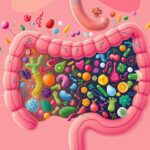Maintaining a healthy heart is a top priority for many individuals, and one of the crucial factors in achieving this goal is managing cholesterol levels. While medication can be an effective option, many people are increasingly looking for natural approaches to lower their cholesterol and improve their overall cardiovascular health. This comprehensive guide explores various natural methods that can help reduce cholesterol levels and promote a healthier heart.
Key Takeaways
- Natural methods can effectively lower cholesterol levels without the use of medications
- Dietary changes, including incorporating heart-healthy foods and limiting unhealthy fats, play a crucial role in cholesterol management
- Regular exercise and stress management techniques can also contribute to better cholesterol control
- Certain herbs and supplements may provide additional support for maintaining healthy cholesterol levels
- Adopting a holistic approach that combines multiple natural strategies can lead to long-term improvements in heart health
Understanding Cholesterol and Its Impact on Health
Cholesterol is a waxy substance found in the bloodstream and in all the cells of the human body. While it plays a vital role in various bodily functions, an imbalance in cholesterol levels can lead to significant health concerns, particularly for the heart and cardiovascular system.
The Difference Between Good and Bad Cholesterol
There are two main types of cholesterol: high-density lipoprotein (HDL) and low-density lipoprotein (LDL). HDL, often referred to as “good” cholesterol, helps remove excess cholesterol from the body, while LDL, known as “bad” cholesterol, can contribute to the buildup of plaque in the arteries, increasing the risk of heart disease and stroke.
How High Cholesterol Affects Your Body
High levels of LDL cholesterol can lead to the formation of plaque in the arteries, a condition known as atherosclerosis. This narrowing and hardening of the arteries can restrict blood flow, potentially causing chest pain, heart attack, or stroke. Elevated cholesterol levels may also increase the risk of other health problems, such as kidney disease and peripheral artery disease.
Normal Cholesterol Level Ranges
The recommended cholesterol levels for adults are as follows:
- Total cholesterol: Less than 200 mg/dL
- LDL (bad) cholesterol: Less than 100 mg/dL
- HDL (good) cholesterol: 40 mg/dL or higher for men, 50 mg/dL or higher for women
- Triglycerides: Less than 150 mg/dL
It’s essential to work with your healthcare provider to monitor your cholesterol levels and take appropriate steps to maintain a healthy balance.

“Maintaining healthy cholesterol levels is crucial for overall cardiovascular health and well-being.”
Natural Methods for Reducing Cholesterol Levels
Maintaining healthy cholesterol levels is crucial for your overall heart health. While medication can be an effective option, many individuals prefer to explore natural methods for reducing cholesterol levels. These lifestyle changes can have a significant impact on your wellbeing without the potential side effects of prescription drugs.
One of the most effective natural methods for reducing cholesterol levels is through dietary modifications. By incorporating heart-healthy foods into your daily routine, you can help lower your LDL (bad) cholesterol and raise your HDL (good) cholesterol. Certain foods, such as oats, nuts, and avocados, are rich in soluble fiber, which can bind to cholesterol and eliminate it from the body.
Alongside dietary changes, lifestyle changes play a crucial role in managing cholesterol levels. Regular exercise has been shown to increase HDL cholesterol, while also reducing LDL cholesterol and overall triglyceride levels. Activities like brisk walking, swimming, or cycling can be great options to improve your cardiovascular health.
In addition to diet and exercise, herbal remedies and natural supplements can also provide support for healthy cholesterol levels. Ingredients like garlic, red yeast rice, and plant sterols have been studied for their potential to lower LDL cholesterol and support overall heart health.
By incorporating a combination of these natural methods for reducing cholesterol levels, you can take a proactive approach to managing your heart health and reduce your risk of cardiovascular disease.

“Making simple lifestyle changes can have a significant impact on your cholesterol levels and overall heart health.”
Essential Dietary Changes for Lower Cholesterol
Maintaining a healthy diet is crucial for managing cholesterol levels. By making strategic diet modifications, you can effectively lower your cholesterol and improve your overall heart health. Let’s explore the essential dietary changes you can implement to reduce cholesterol levels naturally.
Foods to Add to Your Diet
Incorporating the right foods into your diet can significantly contribute to lowering cholesterol. Focus on increasing your fiber intake by adding more whole grains, fruits, vegetables, and legumes to your meals. Oats, barley, and other soluble fiber-rich foods can help reduce LDL (bad) cholesterol levels.
Healthy fats, such as those found in avocados, nuts, and olive oil, can also help raise HDL (good) cholesterol while lowering LDL cholesterol. Lean proteins, such as fish, poultry, and plant-based options, can also contribute to a heart-healthy diet.
Foods to Avoid or Limit
- Saturated and trans fats, found in fried foods, processed snacks, and high-fat dairy products
- Refined carbohydrates, such as white bread, pastries, and sugary cereals
- Excessive red meat and processed meats, which can raise cholesterol levels
Meal Planning Tips
Effective meal planning can make a significant difference in managing your cholesterol levels. Incorporate a variety of nutrient-dense foods into your daily meals, and consider portion control to maintain a balanced diet. Experiment with heart-healthy recipes and find substitutes for high-cholesterol ingredients. With a little planning and creativity, you can enjoy delicious and cholesterol-lowering meals.
| Recommended Foods | Foods to Avoid or Limit |
|---|---|
|
|

“A heart-healthy diet is the first line of defense against high cholesterol. By making smart food choices, you can lower your risk of heart disease and improve your overall well-being.”
The Power of Regular Exercise in Managing Cholesterol
Maintaining a healthy cholesterol level is crucial for overall heart health, and regular exercise can be a powerful ally in this endeavor. By incorporating exercise routines into your lifestyle, you can effectively manage your cholesterol levels and improve your weight management.
Aerobic activities, such as brisk walking, jogging, swimming, or cycling, are particularly beneficial for reducing bad (LDL) cholesterol and increasing good (HDL) cholesterol. These exercises promote cardiovascular fitness and help to burn excess calories, leading to a healthier weight and a more stable cholesterol profile.
Strength training is another essential component of an exercise routine that can positively impact cholesterol levels. By building muscle mass, you can boost your metabolism, which in turn helps to lower LDL cholesterol and support overall weight management.
- Aim for at least 150 minutes of moderate-intensity aerobic activity or 75 minutes of vigorous-intensity aerobic activity per week.
- Incorporate strength training exercises, such as weightlifting or resistance band workouts, at least two days per week.
- Start slowly and gradually increase the duration and intensity of your workouts to avoid injury and ensure long-term sustainability.
Remember, consistency is key when it comes to exercise and cholesterol management. By making physical activity a regular part of your routine, you can effectively reduce your cholesterol levels, manage your weight, and improve your overall cardiovascular health.

| Exercise Type | Benefits for Cholesterol | Recommended Weekly Frequency |
|---|---|---|
| Aerobic | Lowers LDL cholesterol, increases HDL cholesterol | 150 minutes of moderate-intensity or 75 minutes of vigorous-intensity |
| Strength Training | Builds muscle mass, boosts metabolism, and supports weight management | 2 days per week |
“Regular exercise is one of the most effective and natural ways to manage your cholesterol levels and improve your overall heart health.”
By incorporating a balanced exercise routine into your lifestyle, you can take a significant step towards achieving better cholesterol control and a healthier future.
Heart-Healthy Herbs and Supplements
When it comes to managing cholesterol levels, natural remedies can be a valuable complement to lifestyle adjustments and medical treatment. Herbal remedies and natural supplements offer a range of benefits for heart health, and they can be a safe and effective way to support overall well-being.
Beneficial Herbs for Cholesterol Management
Several herbs have been studied for their ability to help lower cholesterol levels. Some of the most promising options include:
- Garlic: Known for its anti-inflammatory properties, garlic has been shown to reduce both total and LDL (“bad”) cholesterol levels.
- Ginger: This versatile herb can help lower triglycerides and improve cholesterol ratios, making it a heart-healthy choice.
- Turmeric: The active compound in turmeric, curcumin, has been found to decrease LDL cholesterol and increase HDL (“good”) cholesterol.
Natural Supplements That Work
In addition to herbs, certain natural supplements can also be beneficial for managing cholesterol levels. Some of the top options include:
- Omega-3 fatty acids: Found in fish oil and krill oil, omega-3s can help lower triglycerides and improve the balance of good and bad cholesterol.
- Coenzyme Q10 (CoQ10): This nutrient plays a crucial role in energy production and has been shown to help reduce LDL cholesterol and blood pressure.
- Plant sterols and stanols: These plant-based compounds can block the absorption of cholesterol, leading to lower overall levels.
Proper Dosage and Safety Guidelines
When using herbal remedies or natural supplements, it’s important to follow the recommended dosage and be aware of any potential interactions or side effects. Always consult with a healthcare professional before starting a new regimen, especially if you are taking prescription medications. Proper research and guidance can help ensure the safe and effective use of these natural cholesterol-lowering options.
| Herb/Supplement | Potential Benefits | Recommended Dosage |
|---|---|---|
| Garlic | Reduces total and LDL cholesterol | 600-1,200 mg per day |
| Ginger | Lowers triglycerides, improves cholesterol ratios | 1-3 grams per day |
| Turmeric (curcumin) | Decreases LDL, increases HDL cholesterol | 500-2,000 mg per day |
| Omega-3 fatty acids | Lowers triglycerides, improves cholesterol balance | 1-4 grams per day |
| Coenzyme Q10 (CoQ10) | Reduces LDL cholesterol, lowers blood pressure | 100-300 mg per day |
| Plant sterols and stanols | Block absorption of cholesterol | 2-3 grams per day |
“Integrating natural remedies and supplements alongside lifestyle changes can be a powerful approach to managing cholesterol levels and promoting overall heart health.”
Lifestyle Modifications for Better Cholesterol Control
Achieving optimal cholesterol levels involves more than just dietary changes and exercise. Adopting a comprehensive lifestyle approach can significantly enhance your efforts to manage cholesterol and promote heart health. Let’s explore some key lifestyle modifications that can contribute to better cholesterol control.
Quit Smoking for Healthier Cholesterol Levels
One of the most impactful lifestyle changes you can make is to quit smoking. Smoking has a direct negative impact on cholesterol levels, increasing the risk of developing high LDL (bad) cholesterol and lowering HDL (good) cholesterol. By quitting smoking, you can see a noticeable improvement in your overall cholesterol profile within a relatively short period.
Limit Alcohol Consumption
Excessive alcohol consumption can also contribute to elevated cholesterol levels. While moderate alcohol intake, such as one drink per day for women and up to two drinks per day for men, has been associated with some potential health benefits, excessive drinking can have the opposite effect. Aim to limit your alcohol consumption to maintain a healthy cholesterol balance.
Manage Stress for Cardiovascular Well-being
Stress can have a significant impact on your cholesterol levels and overall cardiovascular health. High levels of stress can lead to an increase in cortisol, a hormone that can raise LDL cholesterol and triglycerides. Incorporating stress management techniques, such as meditation, yoga, or regular exercise, can help you maintain a healthier cholesterol profile and support your heart health.
By embracing these lifestyle changes, you can take a holistic approach to managing your cholesterol levels and cultivating a healthier, more balanced lifestyle. Remember, small, sustainable steps can lead to profound improvements in your overall well-being.
The Role of Fiber in Cholesterol Reduction
Dietary fiber plays a crucial role in managing cholesterol levels. By understanding the difference between soluble and insoluble fiber, you can make informed choices to increase fiber intake and optimize your diet modifications for better heart health.
Soluble vs. Insoluble Fiber
Soluble fiber, such as that found in oats, beans, and berries, helps to reduce LDL (bad) cholesterol by binding to it and removing it from the body. Insoluble fiber, like the kind found in whole grains and vegetables, promotes regularity and supports overall digestive health, which can also contribute to better cholesterol management.
Best Sources of Dietary Fiber
To increase fiber intake and support healthy cholesterol levels, consider incorporating the following fiber-rich foods into your diet:
- Oats and oatmeal
- Beans, lentils, and legumes
- Berries (such as raspberries, blueberries, and blackberries)
- Whole grains (such as quinoa, brown rice, and whole wheat)
- Avocados
- Broccoli and other leafy greens
- Chia seeds and flaxseeds
By making these diet modifications and prioritizing fiber-rich foods, you can help lower your cholesterol levels and improve your overall heart health.
“Incorporating more fiber into your diet is one of the simplest and most effective ways to manage your cholesterol levels naturally.”
Healthy Fats and Their Impact on Cholesterol
When it comes to managing cholesterol levels, the type of fats you consume plays a crucial role. While some fats can contribute to high cholesterol, there are also healthy fats that can actually help lower your cholesterol and improve your overall heart health.
One of the most beneficial types of healthy fats is omega-3 fatty acids. These essential fats are found in foods like fatty fish, walnuts, and flaxseeds. Numerous studies have shown that consuming omega-3s can reduce triglycerides, increase HDL (good) cholesterol, and lower LDL (bad) cholesterol. By incorporating more omega-3-rich foods into your diet modifications, you can help consume healthy fats and support a healthier cholesterol profile.
Another group of healthy fats that can positively impact cholesterol are monounsaturated fats. These can be found in avocados, olive oil, and nuts like almonds and cashews. Monounsaturated fats have been linked to increased HDL cholesterol and decreased LDL cholesterol, making them a heart-healthy addition to your diet.
| Healthy Fats | Benefits for Cholesterol |
|---|---|
| Omega-3 Fatty Acids | Reduce triglycerides, increase HDL, lower LDL |
| Monounsaturated Fats | Increase HDL, decrease LDL |
By focusing on consuming healthy fats and making strategic diet modifications, you can take an important step towards managing your cholesterol levels and supporting overall heart health.
“Healthy fats like omega-3s and monounsaturated fats are essential for keeping your cholesterol in check and promoting cardiovascular well-being.”
Stress Management Techniques for Heart Health
Maintaining a healthy heart goes beyond just managing your diet and exercise routine. Stress can also have a significant impact on your cholesterol levels and overall cardiovascular health. By incorporating effective stress management techniques into your lifestyle, you can take a proactive approach to supporting your heart’s wellbeing.
Meditation and Mindfulness Practices
Mindfulness and meditation have been shown to have a positive effect on reducing stress and anxiety, which can ultimately help lower cholesterol levels. Engaging in regular meditation or mindfulness exercises, such as deep breathing, can promote a sense of calm and help you better manage stressful situations.
Exercise as Stress Relief
Regular physical activity not only supports cardiovascular health, but it can also serve as an effective stress-relieving tool. Activities like brisk walking, jogging, or yoga can help release endorphins, reduce muscle tension, and provide a much-needed mental break from the demands of daily life. Incorporating stress-relieving exercise into your routine can contribute to a healthier cholesterol profile.





